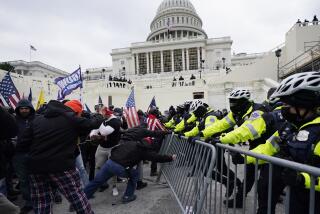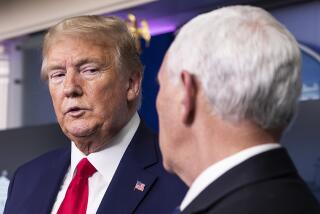Is America Safer Now?
- Share via
For all the expert sparring Thursday between national security advisor Condoleezza Rice and members of the 9/11 panel, there was a curious hole in her nearly three hours of testimony. Rice did not persuasively explain whether the “many things out of kilter structurally” in U.S. intelligence agencies have been repaired. The unspoken, hovering question was this: Is the U.S. safer now than it was before 9/11? Some of this gap is because of the mission of the panel, called to figure out what led to the terror attacks. But the questions won’t go away.
Rice, saying she had been focused on larger strategic issues pre-9/11, dodged questions about a memo to her from then-anti-terrorism chief Richard Clarke urging White House pressure to force various agencies to cooperate against terrorist threats. Rice tried to dismiss Clarke’s memo as an attempt to “buck me up” to resist bureaucratic inertia, but it was more than that. No matter how much Rice tried to spin it, Clarke was warning that the U.S. was dangerously open to attack. Commission member Jamie Gorelick acidly noted that even if Rice was, as she said, receiving memos from Clarke about the blundering of the FBI and CIA, her own written policy review of terrorism had “nothing in it about the vast domestic landscape that ... needed so much attention.”
As Rice portrayed it, the creation of the Homeland Security Department should cure the oversights and poor interagency communications that preceded Sept. 11, 2001. In theory, yes. But the department has little power to coordinate intelligence and struggled even to create a consolidated terrorist “watch list” -- a job that has now been handed to the FBI. The department has not filled the job of coordinator for the Washington, D.C., area for five months.
Nor was Rice able to point to any officials punished for intelligence failures. With the U.S. mired in a two-front battle against Iraq’s Shiite and Sunni Muslims, the breakdown of intelligence before 9/11 looks more like a continuing and systemic problem. The intelligence services that could not assess the existence of weapons of mass destruction in Iraq or predict its postwar chaos are now scrambling to grasp a network of foreign and homegrown resistance and terror there. Following Rice’s testimony, Sen. Bob Graham (D-Fla.), co-chairman of the House-Senate joint inquiry into intelligence failures, complained that “there have been no structural reforms of the intelligence community initiated by this administration.”
Rice ably parried the commission’s questions, but she and other officials still bear the consequences of bad intelligence in Iraq that bogs down U.S. troops, and in Afghanistan, where the Taliban is back on the rise. No matter how much Rice portrays President Bush as having been alert to terrorist dangers before 9/11, the more important concern is why he isn’t doing more to solve the intelligence gaps that led to the disaster.
More to Read
Sign up for Essential California
The most important California stories and recommendations in your inbox every morning.
You may occasionally receive promotional content from the Los Angeles Times.









